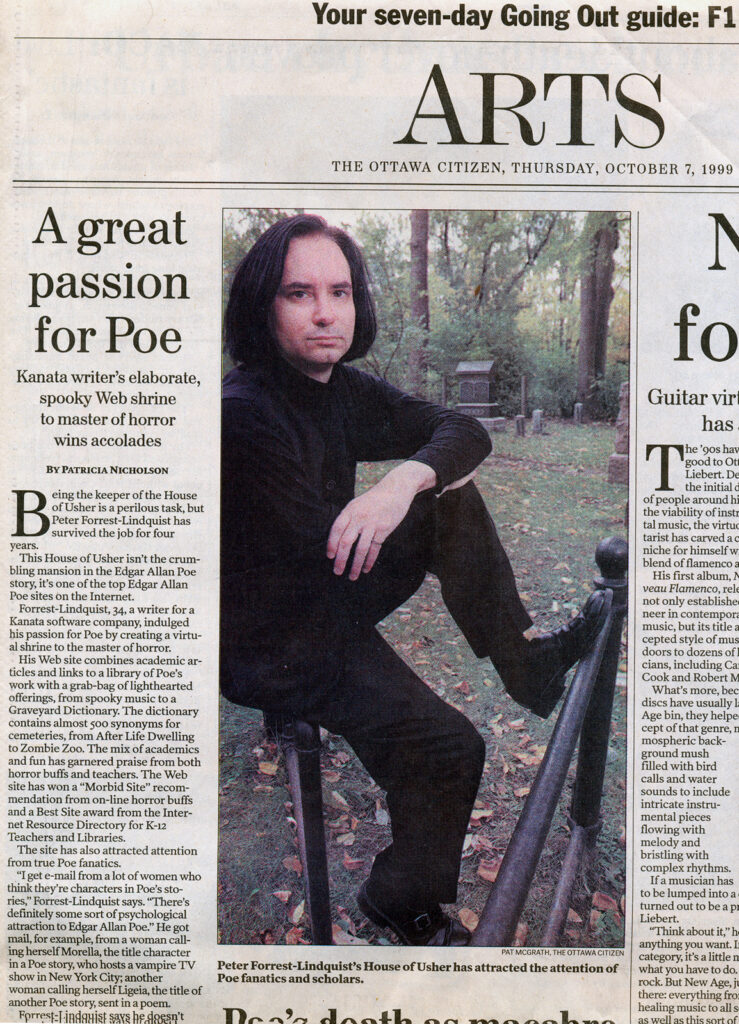A great passion for Poe
October 7th, 1999 – Ottawa Citizen

Kanata writer’s elaborate spooky Web shrine to master of horror wins accolades
by Patricia Nicholson
Being the keeper of The House of Usher is a perilous task, but Peter Forrest-Lindquist has survived the job for four years. This House of Usher isn’t the crumbling mansion in the Edgar Allan Poe story, it’s one of the top Edgar Allan Poe sites on the Internet.
Forrest-Lindquist, 34, a writer for a Kanata software company, indulged his passion for Poe by creating a virtual shrine to the master of horror. His Web site combines academic articles and links to a library of Poe’s work with a grab-bag of lighthearted offerings, from spooky music to a Graveyard Dictionary. The dictionary contains almost 500 synonyms for cemeteries, from After Life Dwelling to Zombie Zoo. The mix of academics and fun has garnered praise from both horror buffs and teachers. The Web site has won a “Morbid Site” recommendation from on-line horror buffs and a Best Site award from the Internet Resource Directory for K-12 Teachers and Libraries.
The site has also attracted attention from true Poe fanatics. “I get e-mail from a lot of women who think they are characters in Poe’s stories, ” Forrest-Lindquist days. “There’s definitely some sort of psychological attraction to Edgar Allan Poe.” He got mail, for example, from a woman calling herself Morella, the title character in a Poe story, who hosts a vampire TV show in New York City; another woman calling herself Ligeia, the title of another Poe story, sent in a poem. Forrest-Lindquist says he doesn’t find these alter-egos creepy, but acknowledges that it seems to be a particularly female quirk.
And he certainly can understand the obsession. Forrest-Lindquist discovered Poe at age 10 when he read The Murders in the Rue Morgue and The Raven in a Book of the Month Club volume that his mother ordered. He’s been an advocate of the dark psychological aspects of Poe’s works ever since. “I love the character of the person’s who’s lost it all, and there’s only one way to go: you’re going down,” he says. When he started doing hi-tech writing for a software company, Forrest-Lindquist became interested in building a Web site. While trying to decide on a site topic, his eyes fell on a Poe postcard on the wall beside the computer, and Poe entered cyberspace in February 1995.
The library has now swelled to over a hundred links, and keeps growing. The site now includes an instructional page for students researching papers on Poe, to help cut down on the e-mail load. Besides research questions, some e-mails ask for help in identifying old Poe books from Grandma’s attic, and some just share thoughts on Poe’s stories and poems.
He recently translated the Web site into French, a major undertaking. But the House of Usher also brings opportunities. Forrest-Lindquist recently had the chance to merge his interest in piano music with his Poe projects. An e-mail from a German film director got him involved in two German films that will be aired this month on the European arts channel ARTE. One is a short experimental film on The Raven, and the other a documentary entitled Edgar Allan Poe: Visionary of the Unreal.
The experimental film on The Raven includes video footage of Forrest-Lindquist playing piano and discussing the inspirational aspects of the poem, and also features a cameo appearance by the House of Usher Web site.
The music that Forrest-Lindquist performed and recorded for the film is his own piano composition, Sleepless Nocturne. Forrest-Lindquist is also credited for the music in the documentary film. The two songs he played and recorded for Visionary of the Unreal date from Poe’s era. One was Poe’s favourite song, Come Rest in this Bosom. The other was once sung by Poe’s mother.
The films are an example of the kind of projects Poe inspires, as is House of Usher.
“The main thing about Poe as a great writer is not just that he influenced other writers,” Forrest-Lindquist says.
“He influenced day to day people to have some kind of passion.”